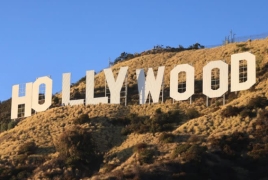Trump's foreign film tariff shocks Hollywood May 6, 2025 - 12:11 AMT PanARMENIAN.Net - President Donald Trump's recent proposal to impose a 100% tariff on all films produced outside the United States has sent shockwaves through Hollywood, leaving filmmakers and financiers perplexed and alarmed. The announcement has raised fears of significant disruptions to the iconic American film industry, CNN reports. Several executives from major movie studios and streaming platforms expressed their dismay, arguing that the president's plan lacks consideration for its potential consequences, which could severely impact the industry. “On first blush, it’s shocking and would represent a virtually complete halt of production,” one industry insider remarked. “But in reality, he has no jurisdiction to do this and it’s too complex to enforce.” Some insiders suggest that Trump's proposal might be an attempt to address the issue of "runaway production," where film and TV projects are increasingly being produced abroad, leading to job losses in the U.S. industry. However, the mere suggestion of such tariffs has introduced further instability into an already volatile market. On Monday, shares of Netflix and other major entertainment companies declined as investors grappled with the implications of Trump's statements. “In its current form, the tariff doesn’t make sense,” Jay Sures, vice chairman of United Talent Agency, told CNN. American actors and directors generally prefer to work domestically. But “the fact is it’s cheaper for Hollywood studios to pay for everyone to get on planes, pay for hotels, because the cost of labor, lack of rebates, and the ability to make things overseas is infinitely cheaper,” Sures said. Sures noted that it can be significantly cheaper to make movies abroad, so a blanket tariff “has the ability to bring the movie business to a standstill – which is the last thing Hollywood needs after dual strikes and a content recession.” Some industry sources expressed skepticism about the feasibility of implementing such tariffs. Since movies are considered intellectual property—a form of services rather than goods—they are typically not subject to tariffs, making the logistics of Trump's proposal unclear. Moreover, Trump's claim that foreign film production poses a "national security threat" may face legal challenges and scrutiny. Despite these concerns, entertainment industry leaders are taking the proposal seriously. Multiple executives have reportedly reached out to Commerce Secretary Howard Lutnick to discuss the tariff plan. Lutnick responded to Trump's demand on social media platform X, stating, “We’re on it.” Trump's social media post may have been just an opening gambit. In the Oval Office Monday, Trump said he would hold meetings with Hollywood executives before making a final decision. “We’re going to meet with the industry; I want to make sure they’re happy about it,” Trump said. The belief that Hollywood needs a boost crosses party lines. When Trump took office, he named Jon Voight, Mel Gibson and Sylvester Stallone as his emissaries to Hollywood, though it was never particularly clear what that designation would mean. Trump met over the weekend with actor Jon Voight at Mar-a-Lago to discuss plans for reviving the American film industry, according to a person familiar with the matter. Voight had been developing a plan along with his manager, Steven Paul, and the plan included ideas for tax incentives, but not specifically on new tariffs, the person said. A White House spokesperson, Kush Desai, said, “while no final decisions on foreign film tariffs have been made, the Administration is exploring all options to deliver on President Trump’s directive to safeguard our country’s national and economic security while Making Hollywood Great Again.” The White House’s reference to “all options” may calm some nerves, since Hollywood lobbyists have been pushing for carrots (like federal tax incentives for films) rather than sticks (like a tariff) for some time now. Azerbaijani authorities report that they have already resettled 3,000 people in the Nagorno-Karabakh town of Stepanakert. On June 10, Azerbaijani President of Azerbaijan Ilham Aliyev will leave for Turkey on a working visit. Azerbaijani President Ilham Aliyev arrived in Moscow on April 22 to hold talks with Russian counterpart Vladimir Putin. Authorities said a total of 192 Azerbaijani troops were killed and 511 were wounded during Azerbaijan’s offensive. Partner news |